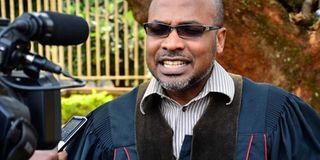Pastor Ssempa summoned by US court

Pastor Martin Ssempa of Makerere Christian Centre. File photo
Given Ugandan pastor Martin Ssempa’s central role in coordinated efforts to fight homosexuality in Uganda alongside Scott Lively, a United States -based anti-gay extremist and others, Sexual Minorities Uganda (SMUG) has sought to obtain his testimony in its lawsuit against Lively.
Because Ssempa holds a US citizenship, he can be compelled to appear as a witness by a US court via a subpoena, which is an order compelling testimony from a non-party witness in a given lawsuit.
Ssempa’s subpoena has been publicized widely in local media as notice for his required required testimony in the Lively lawsuit.
According to Mr Frank Mugisha the Executive Director SMUG, the subpoena is not an attempt to sue Martin Ssempa or to make him a party in this case. Instead, the subpoena simply serves to compel Ssempa to serve purely as a witness in SMUG’s lawsuit against Scott Lively by:
(1) submitting to questioning in a deposition, which is oral testimony under oath that is taken outside of court, and
(2) producing documentary evidence in his possession of Lively's role
in the campaign of persecution.
“It is important that we do not give anyone the impression that SMUG is suing Ssempa in the United States. This case is only against Scott Lively, and Ssempa is only being called as a witness in this case,” said Mr Mugisha.
The summons were issued in May last year but SMUG claims their efforts to serve with the subpoena in order to question him and recover documents Ssempa are yet to yield since they have failed to locate him.

Frank Mugisha, the Executive Director Sexual Minorities Uganda (SMUG) addressing the media. Photo by Joseph Kiggundu
“He has disappeared from social media as well as his TV show and has not been seen publicly,” Mr Mugisha added.
The summons stem from a case filed by SMUG in 2012 against Scott Lively, alleging that Ssempa’s work with other key anti-gay leaders in Uganda to deprive the LGBTI community of fundamental rights constitutes persecution, a crime against humanity in international law. SMUG filed the case in a U.S. court in the state of Massachusetts where Lively lives.
In 2013, the court reportedly dismissed Lively’s application to have the case dismissed and affirmed that persecution on the basis of sexual orientation and gender identity is a crime against humanity.
That decision allowed the case to proceed to the discovery stage. “Discovery,” in U.S. law, is the phase where the parties exchange their evidence, including documents and testimony through depositions, in which witnesses are questioned by the other party’s lawyers outside of court.
Court is set to sit on September 14 this year, for a hearing on a motion for summary judgment, which will determine whether the case should proceed to a full trial before a jury or will be decided by the judge without a trial.
Other Ugandans that the court intends to summon as witnesses include James Nsaba Buturo , David Bahati and Stephen Langa among others. Court seeks their help as witnesses because they are not Americans.




